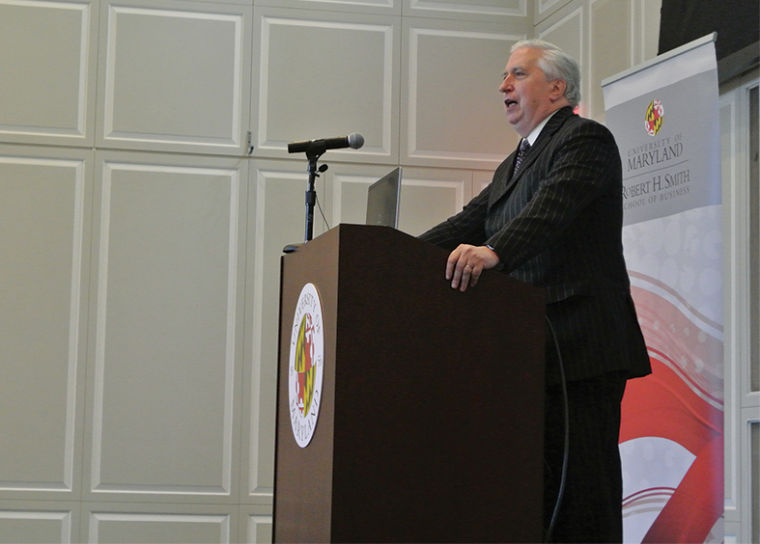
John Coffee Jr., a Columbia Law professor speaks at the business school and criminology and criminal justice department’s official announcement of the opening of the Center for the Study of Business Ethics, Regulation and Crime on Friday, Nov. 8.
This university will soon bring together researchers from different academic fields to scientifically analyze the prevalence of white-collar crime.
The business school and the criminology and criminal justice department officially opened the new Center for the Study of Business Ethics, Regulation, and Crime on Friday. The kick-off event featured keynote speaker John Coffee Jr., a Columbia Law professor, and his presentation, “Missing in Action?: What Explains SEC Passivity.”
C-BERC is the first initiative of its kind to formally pair business with criminology research and formed in response to the recent global financial crisis — a consequence of white-collar crime, said Sally Simpson, C-BERC director and criminology and criminal justice professor.
“Now is the time to identify a common problem between different fields and to be able to bring our different expertise to the specific issues: how much of it is there, the incidence and prevalence of it, how to best control it, how to best prevent it,” Simpson said.
C-BERC’s main goal, Simpson said, is to have evidence-based policy that reflects evaluation and assessment. The center has three ongoing projects: reviewing corporate crime deterrence strategies, building a database on the prevalence of white-collar crime and studying public willingness to pay for white-collar crime control.
“So much of what we get in the news is politically driven. So, regulation is good, regulation is bad. That’s too simplistic,” Simpson said. “What we want to do is scientifically evaluate the success of regulation. Is it achieving its goals, how is it achieving its goals, where are the weaknesses?”
Stephanie Yamini, a senior accounting and supply chain management major who attended the launch event, sees the center as a novel approach to addressing corporate crime.
“I’ve thought about ethics in business and in regulation, but I never thought to combine it with criminology or any other discipline, so I think it’s more eye-opening,” she said.
Accounting graduate student Janice Son said the center’s strength will be its interdisciplinary research.
“This gives more diverse perspectives because it’s not limited to the business school,” she said.
The center, which will have offices in Van Munching Hall beginning in the summer, will also serve as a tool to help businesses combat compliance issues and other challenges they may face. Through its graduate certificate program, students will receive interdisciplinary training in accounting, forensics and criminal investigation, business, law and ethics, Simpson said.
There is no major or minor program for undergraduates, but the center plans to include undergraduates in research projects. They might also have the opportunity to participate in center-sponsored events, Simpson said.
For now, Simpson is encouraged by the fact that businesses now see the persistence of white-collar crime as a serious issue.
“There’s a sense often in the business community that they’ve been unfairly targeted. And when crime is discovered, or illegal conduct, it tends to damage the reputation of businesses, so they try to shy away from the problem,” she said. “Perhaps the most recent crises have made companies realize that this is a salient issue that needs to be addressed.”



